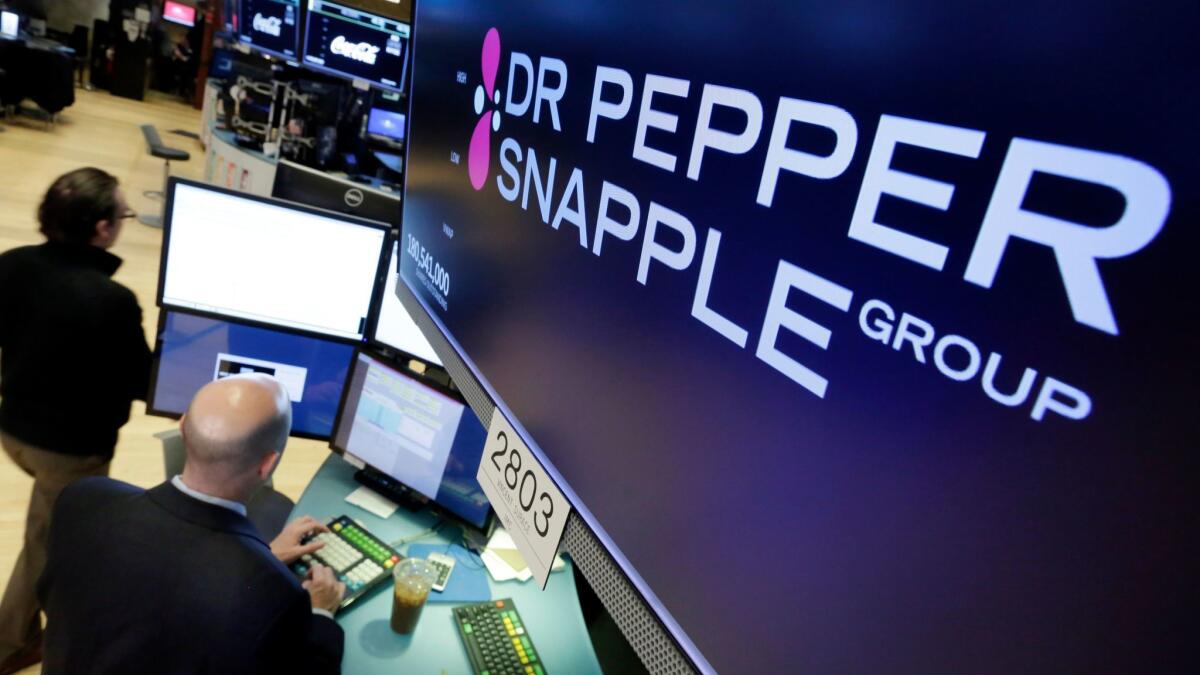Stocks pull back a bit as tech companies fall

- Share via
A broad sell-off Monday handed the U.S. stock market its biggest loss in more than four months, pulling the major indexes below their recent record highs.
Technology stocks, the biggest gainers in 2017, accounted for much of the slide. Energy companies also fell; crude oil prices finished lower. Utilities and other rate-sensitive sectors declined as bond yields hit their highest level in almost four years.
Investors weighed company earnings and deal news, including Keurig’s acquisition of Dr Pepper Snapple, and looked ahead to a busy week of corporate news and economic data.
The pullback followed Friday’s big rally, which gave the stock market its biggest single-day gain since March 2017.
“It may just be we’ve had a really good run and people are taking profit off the table right now,” said Randy Frederick, vice president of trading and derivatives at Charles Schwab.
The Standard & Poor’s 500 index slid 19.34 points to 2,853.53. The Dow Jones industrial average dropped 177.23 points to 26,439.48. The Nasdaq composite fell 39.27 points to 7,466.51. The Russell 2000 index of smaller-company stocks retreated 9.95 points to 1,598.11.
Falling stocks outnumbered rising ones almost 5 to 1 on the New York Stock Exchange.
Bond prices fell. The yield on the 10-year Treasury note rose to 2.70%, the highest level in almost four years, from 2.66% on Friday.
The prospect for stronger economic growth, both in the U.S. and abroad, has helped drive up bond yields. Rising bond yields put pressure on yield-sensitive sectors: real estate investment trusts, telecoms and utilities. The three sectors finished more than 1% lower Monday and are in the red for the year.
On Wednesday and Thursday, several big-name companies are due to report quarterly results, including Apple, Amazon, Microsoft, Facebook and Alphabet, Google’s parent company.
“Combined, that’s 14.3% of the entire S&P 500 index in five companies — $3.6 trillion in market cap — so this is a very important week,” said Mike Baele, senior portfolio manager at U.S. Bank Private Wealth Management.
About a quarter of the companies in the S&P 500 have reported results this earnings season, and some 65% of those have delivered results that exceeded financial analysts’ expectations, according to S&P Global Market Intelligence.
On Monday, Lockheed Martin shares rose 1.9% to $351.42 after the defense contractor posted better-than-expected quarterly results.
Apple fell 2.1% to $167.96 amid growing investor worries that the iPhone X has not been a hit with customers. The tech giant’s stock has been declining for several days, erasing billions of dollars of the company’s market capitalization. Apple is scheduled to report its earnings Thursday.
New data on U.S. jobs, manufacturing and consumer sentiment also land this week.
The Commerce Department said Monday that consumer spending rose 0.4% in December, a solid pace but less than in November.
Also on investors’ radar: President Trump will deliver his State of the Union address Tuesday night. Investors will be listening for any insights on U.S. trade policy, Baele said. “This is one of the few prepared speeches that the president will give, so the progress on NAFTA and trade with China is something the market is going to watch carefully.”
And on Wednesday, a two-day meeting of the Federal Reserve’s policymaking committee wraps up. The Fed has signaled it expects to raise its key short-term interest rate three times this year. But some investors speculated that the growing strength in the U.S. economy and labor market could prompt the central bank to perhaps forecast an extra rate increase this year.
Traders welcomed a crop of corporate deals Monday.
Dr Pepper Snapple Group soared 22.4% to $117.07 after it agreed to be acquired by Keurig for $16.6 billion, including debt. The deal would create a beverage giant with about $11 billion in annual sales and a stable of brands including Dr Pepper, 7UP, Snapple, A&W, Mott’s and Sunkist, as well as Keurig’s single-serve coffee makers.
KapStone Paper and Packaging soared 30.8% to $34.71 after it agreed to be bought by rival WestRock for $35 a share, or $3.39 billion. WestRock fell 2.6% to $68.41.
Benchmark U.S. crude fell 58 cents, or about 1%, to $65.56 a barrel. Brent crude, used to price international oils, dropped $1.06, or 1.5%, to $69.46 a barrel.
Gold, which hit an 18-month high last week, fell $11.80 to $1,340.30 an ounce. Silver dropped 31 cents, or 1.8%, to $17.13 an ounce. Copper slipped 1 cent to $3.19 a pound.
The dollar, which fell sharply last week, rose to 108.94 yen from 108.66 yen. The euro fell to $1.2389 from $1.2423.
The price of bitcoin fell 4.2% to $11,207, according to the tracking site CoinDesk. Bitcoin futures on the Cboe Futures Exchange rose 2.1% to $11,170.
Germany’s DAX and France’s CAC 40 fell 0.1% on Monday. Britain’s FTSE 100 edged up 0.1%. Japan’s benchmark Nikkei 225 finished flat. Hong Kong’s Hang Seng index lost 0.6%. South Korea’s Kospi gained 0.9%.
UPDATES:
2:50 p.m.: This article was updated with closing prices, context and analyst comment.
This article was originally published at 7 a.m.
More to Read
Inside the business of entertainment
The Wide Shot brings you news, analysis and insights on everything from streaming wars to production — and what it all means for the future.
You may occasionally receive promotional content from the Los Angeles Times.










